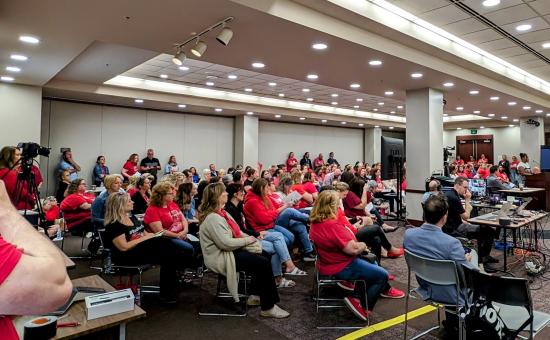Educators Tell State Board to Fix Literacy Endorsement and Strengthen Diploma Proposal
05/08/2024
More than 150 educators from around the state converged at the State Board of Education meeting today in Indianapolis, filling the room to capacity and even spilling into the hallways, to voice their concerns about two critical issues: the literacy endorsement requirements and proposed changes to high school diplomas.
The meeting began with Secretary of Education Katie Jenner acknowledging the presence of educators from across the state. She highlighted that over 3,000 comments had been received on the diploma proposal, indicating the depth of concern within the education community. Jenner also addressed the literacy endorsement requirement, pointing to data about student literacy rates and Indiana's investment in the Science of Reading.
The state board, typically engaged in various business items, had an unusually focused agenda with only a consent agenda to address. Throughout the meeting, board members remained silent listeners, not interacting with any of the speakers. This lack of engagement drew attention, particularly when several speakers asked board members to put down their phones and give full attention to the urgent issues being presented by the educators.
Regarding the literacy endorsement, ISTA Treasurer Diana Reed spoke out against the Praxis exam, labeling it as an unnecessary burden on teachers. She and other ISTA members advocated for the removal of the Praxis requirement and recognizing professional development already taken by most teachers, emphasizing the need for policies that genuinely respect, support, and empower educators rather than adding to their challenges. Reed's comments highlighted how these burdens are adding to teacher burnout and detract from teachers' focus on student learning and well-being.
Public comment then shifted to the proposed changes to the high school diploma structure. ISTA Vice President Jennifer Smith-Margraf presented a list of concerns about the extensive proposal, urging for more stakeholder meetings where educators could provide feedback beyond the limited three-minute speaking time at the board meeting. Educators expressed worries about the Flex 40 model and the more stringent Flex 40 Plus option, voicing concerns that the new structure might focus too narrowly on preparing students for specific jobs and neglect the broader goal of nurturing well-rounded, informed citizens.
The strong turnout and heartfelt testimonies underscored the deep impact of these policies on educators' professional lives and their commitment to advocating for change. As the state board continues its rulemaking process on diplomas and the department of education continues the rollout of the literacy endorsement process, the voices of Indiana’s educators will be crucial in shaping policies that truly meet the needs of our students.
Comments on the high school diplomas can be sent using an online form and feedback on the literacy endorsement process can be emailed to inlitcenter@doe.in.gov.
